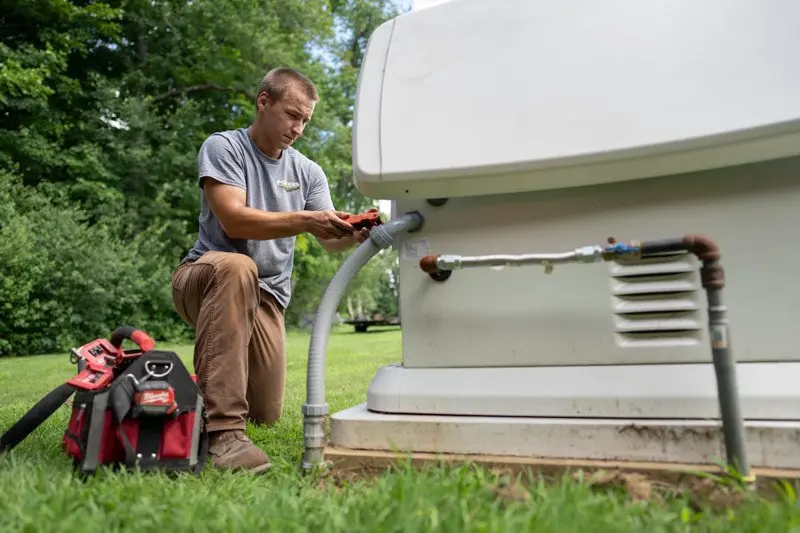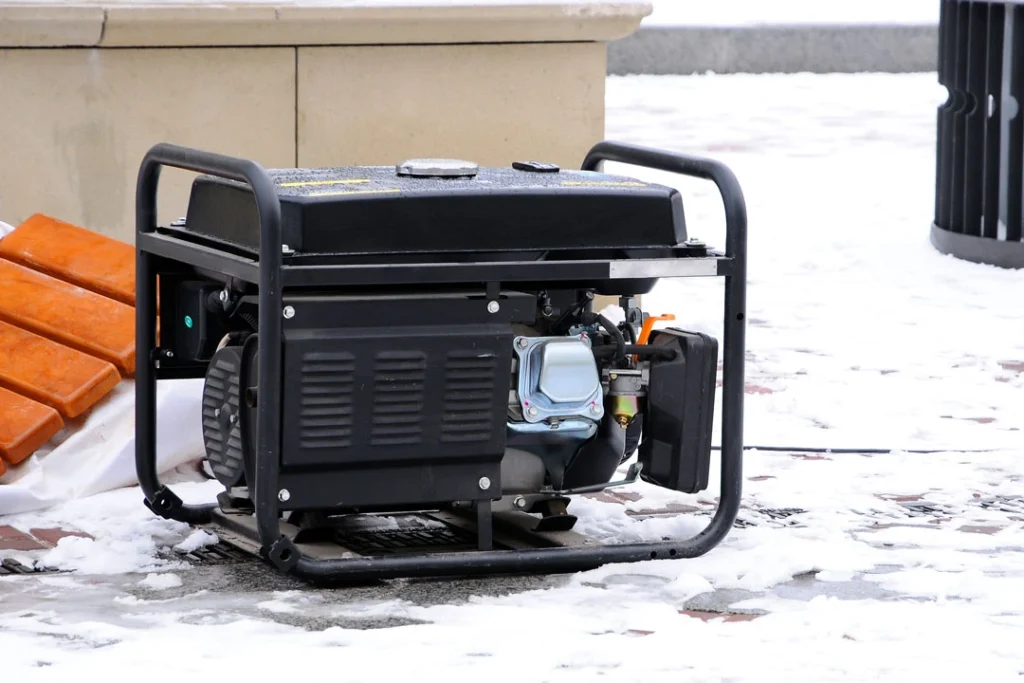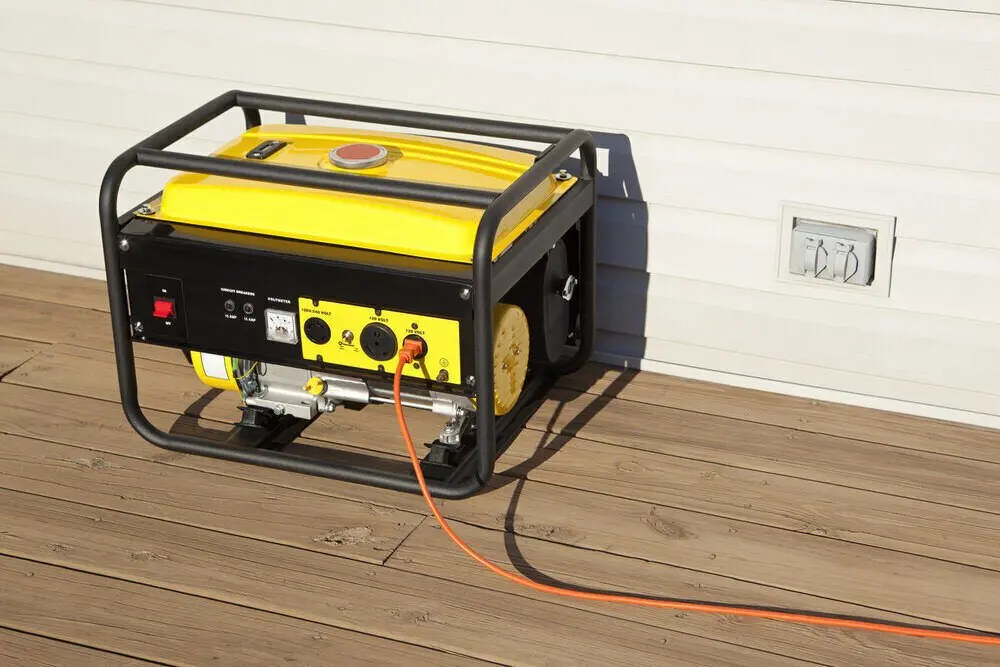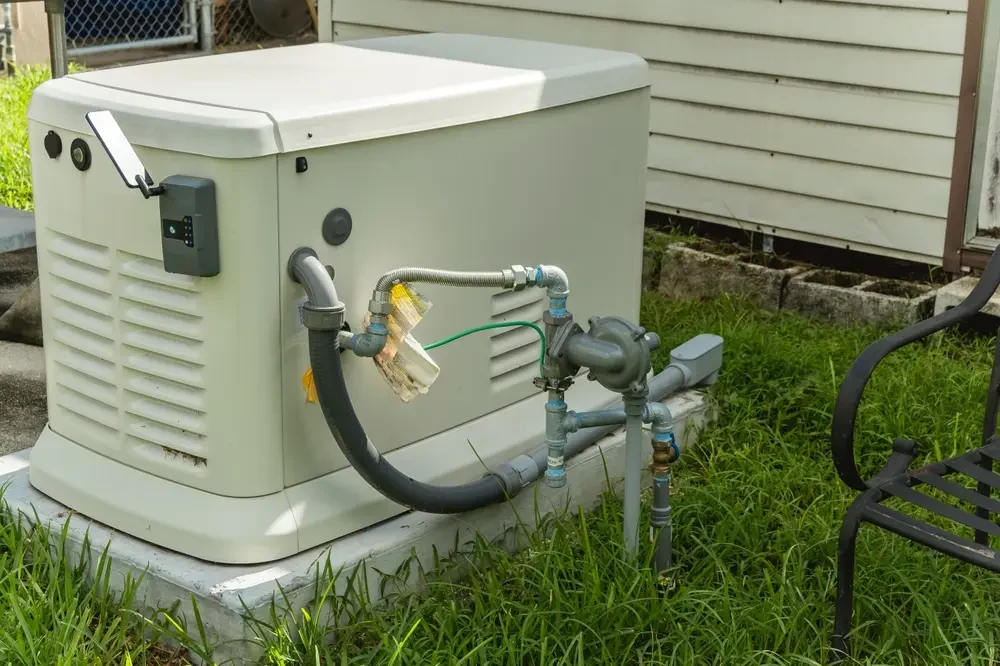If your generator will not start, the issue usually comes down to fuel supply, spark plugs, oil levels, battery condition, or clogged filters.
These are among the most common generator problems homeowners and businesses face, and they can often be solved with simple checks before calling for service. This guide explains generator problems and solutions step by step.
At Grounded Electric, we understand the stress when a generator stops working at the moment you need it most. With decades of field expertise, our licensed team ensures your backup power runs safely and reliably.
Key Takeaways
- Generators often fail due to fuel supply issues, spark plugs, clogged filters, low oil levels, or battery faults.
- Storage-related problems like stale fuel older than two months and weak batteries are common after long idle periods.
- Diesel and petrol generators face unique challenges, from wet stacking to water contamination.
- Regular maintenance intervals for oil, filters, and spark plugs prevent most failures.
- Professional service is recommended for persistent failures, coolant leaks, or electrical faults.
Common Reasons a Generator Won’t Start
What is the most common reason a generator won’t start?
Fuel is the top cause. Empty tanks, stale gasoline, or blocked fuel lines prevent ignition. In diesel generator models, trapped air in the lines can also stop starting.
What is the first step you should take if your generator won’t start
Check the control switch, fuel valve, spark plugs, and air filter. Always check the oil level to make sure the engine is safe to operate. These basic steps often restore function quickly.

Generator cranking but not starting
If a generator cranks but fails to start, the spark plugs may be fouled or the ignition coil may not be working properly. Cleaning plugs with a wire brush and confirming airflow often resolves this.
Gas generator won’t start: possible causes
Gas generators fail due to stale gasoline, dirty carburetors, or condensed water in tanks. In many cases, a gasoline generator not working also indicates a clogged carburetor or degraded fuel. Draining fuel and cleaning the carburetor usually solves the issue.
Portable generator won’t start: quick checks
Portable units require the same checks with extra attention to the choke and pull-start. If repeated pulls fail, follow the startup checklist. A portable generator not working after these checks may need professional inspection.
Quick Startup Checklist
Quick Startup Steps:
- Set the control switch to reset.
- Inspect spark plugs and remove the spark plug if cleaning or replacement is needed.
- Check fuel tanks and lines.
- Replace the air filter if clogged.
- Reset the circuit breaker.
This sequence reflects how Barret Abramow and his team troubleshoot in the field.
Generator Will Not Start After Sitting
How to start a generator after sitting
Old fuel, thick oil, and weak batteries are common after long storage. Replace fuel older than two months, check the oil level, and recharge the battery before trying again.
Brand new generator won’t start
Confirm the control switch and fuel are properly set. In diesel models, follow priming instructions to clear trapped air.
RV generator will not start after sitting
RV units fail from clogged carburetors or weak batteries. Charge the battery, check the fuel, and clean the air filter.
Maintenance Frequency Guidelines
- Oil change – every 50 hours.
- Spark plug replacement – every 300 hours.
- Air filter replacement – every 200 hours.
- Fuel replacement – every 2 months.
Bobby Mulholland emphasizes preventive care saves both time and money.
Generator Will Not Start in Difficult Conditions
Generator will not start in cold weather
Cold thickens oil and drains batteries. Use low-temperature oil and check the type of oil recommended for your model. Keeping batteries charged improves cold starts.

Gasoline generator not starting
Moisture in fuel causes sputtering. Drain contaminated gasoline and clean the carburetor.
Diesel generator cranks but won’t start
Diesel generator models may fail if air pockets form or wet stacking occurs. Running under proper load and bleeding air prevents this.
Gasoline vs. diesel generator starting issues
Gas units are more sensitive to stale fuel, while diesel generator models face coolant leaks or air in lines. Both require clean filters and regular inspections.
Brand-Specific Generator Issues
Generac generator will not start
Generac units may fail due to faulty switches or tripped breakers. Reset breakers and check fuel before service.
Onan generator will not start
Onan models often need carburetor cleaning or spark plug replacement.
Champion generator will not start
Champion units may fail from choke misalignment, low coolant, or clogged fuel lines.
Brand-Specific Fixes in Detail
- Generac – clean spark arrestor.
- Onan – clear carburetor bowl.
- Champion – confirm choke alignment.
Using OEM spark plugs, filters, and wiring ensures compatibility.
How to Fix a Portable or Gas Generator
How do you fix a portable generator that won’t start?
Check fuel, spark plugs, air filter, and breaker. If it still fails, clean the carburetor and test the battery.

Pull-start generator won’t start
Confirm recoil integrity and choke position. If it still fails, use the checklist above.
Electric start vs. recoil troubleshooting
An electric start relies on battery health, while a recoil starter depends on the plug and cord condition.
Fuel system, carburetor, and wiring checks
Inspect fuel lines, clean carburetors, and tighten wiring. Blocked filters and loose connections are frequent issues. If the vacuum relief valve or other small parts are blocked, the engine run sequence may fail.
Step-by-Step Diagnostic Path
- Check fuel tanks and lines.
- Inspect spark plugs for corrosion.
- Replace the air filter.
- Confirm coolant levels.
- Test breaker and control switch.
Preventive Maintenance and Safety Tips
Routine inspection and cleaning
Inspect spark plugs, filters, and coolant levels on a schedule. Clean with a wire brush when needed.
Fuel storage and replacement schedule
Replace fuel every few months. Diesel should be checked for condensation and drained if needed. Always time to replace fuel that has been older than two months.
Running your generator regularly
Run the generator for 20 minutes every two weeks to prevent generator damage from wet stacking. Bobby Mulholland advises testing under load to confirm it is working properly.
Comprehensive Safety Precautions
Generators should never run indoors due to carbon monoxide. Wear gloves when handling fuel or coolant, and wait before opening hot systems.
Drain condensed water carefully, clean spills, and keep a fire extinguisher nearby. Follow best practices for protecting your generator from rain.
Generator maintenance schedule checklist
- Check fuel levels before every start.
- Inspect spark plugs monthly.
- Replace the air filter every 200 hours.
- Repair coolant leaks immediately.
- Verify the breaker and switch.
When to Call a Professional
Warranty and service center support
If under warranty, contact the manufacturer or service center. Grounded Electric provides expert generator services.
Emergency repair and safety risks
Call a professional if the generator stops under load, leaks coolant, or emits fuel odors. Barret Abramow and his team ensure safe, code-compliant work.
If you face any of these emergencies, contact Grounded Electric right away for fast, reliable service from licensed experts.



